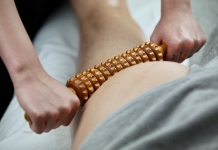Expert Advice: How to treat Rosacea, the ‘The Curse of the Celts’
Andrea O’Donnell looks at self-care and professional treatment of Rosacea, which affects nearly 150,000 people in Ireland.
 Rosacea is a common, chronic inflammatory skin condition which occurs when facial blood vessels become stimulated and dilate, causing the skin to redden and flush easily. Symptoms include skin discoloration, flushing, visible blood vessels, swelling, breakouts or swollen and irritated eyelids.
Rosacea is a common, chronic inflammatory skin condition which occurs when facial blood vessels become stimulated and dilate, causing the skin to redden and flush easily. Symptoms include skin discoloration, flushing, visible blood vessels, swelling, breakouts or swollen and irritated eyelids.
It's thought to affect nearly 150,000 people in Ireland alone and is usually seen in people with pale skin and blue eyes, where its symptoms are easily noticed.
It appears to be more common in women over the age of 30, but men tend to have the more severe symptoms. A possible reason for this could be that men delay medical treatment until rosacea becomes advanced and later develops into Rhinophyma.
We still do not know the cause of Rosacea, or its cure but there is some good news! Rosacea sufferers can improve their chances of maintaining remission by identifying and avoiding lifestyle and environmental factors that trigger rosacea flare-ups. I recommend keeping a journal so you know what to avoid!
To treat Rosacea you will need a combination of oral antibiotics (tetracyclines) to treat inflammation, prescription topical drugs designed to reduce the redness, and good home skin-care practices. For example,
DIBI Milano Procellular 365 oxy serum cream is packed full of Probiotics to strengthen the skin's microbiome and prevent inflammation at night, and Calm Perfection Comfort Cream has a natural green colour to reduce the appearance of red skin with anti-inflammatory properties and UV filters for daily protection.

- A clean gut helps with any inflammatory skin condition. Helicobacter pylori (gut bacteria) stimulates the production of bradykinin, which causes blood vessels to dilate triggering the development of Rosacea.
- Avoid caffeine, alcohol and dairy products (whey protein found in skimmed milk causes inflammation in the skin which can manifest as Acne and Rosacea).
- Avoid food containing Cinnamaldehyde such as chocolate, tomatoes and citrus fruits.
- Avoid skincare with drying alcohols, essential oils and overuse of exfoliating acids such as Salicylic and Glycolic acid.
- Sanitise your phone regularly! Scientists at the University of Arizona have found that cell phones carry 10 times more bacteria than most toilet seats.
- Using probiotic and prebiotic skin care strengthens the skin's microbiome and fights off bad bacteria that cause inflammation. New studies are suggesting that people with Rosacea have more mites called Demodex mites, found on the face. When the mites die, the bacteria is released and leaks into surrounding skin tissues, triggering tissue degradation and inflammation which triggers Rosacea.
- Avoid using harsh cleansers that remove the essential moisturising and nourishing substances that keep your skin barrier healthy. Use products suitable for sensitive skin with hydrating, nourishing and anti-inflammatory properties.
- Ultraviolet rays can trigger a flare up, so it is advisable to avoid direct sunlight and use sunscreen with UVA and UVB, with a minimum SPF 30.
The key to successfully controlling Rosacea is similar to many other skin disorders, catch it in the early stages. With good skincare and lifestyle choices, rosacea need not hold you back.
Andrea O'Donnell is DIBI Milano National Educator for Xpert Professional.





